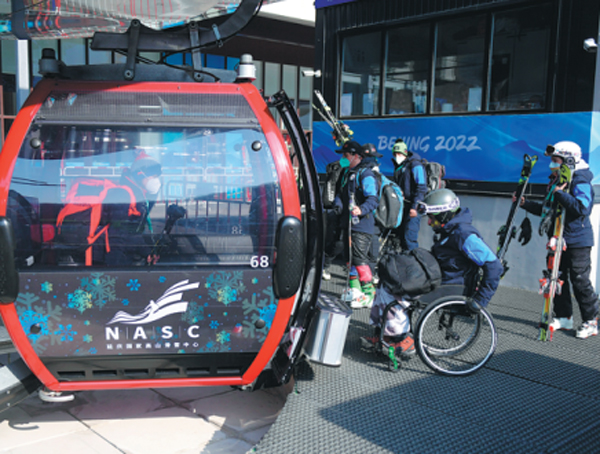Excellence in accessibility to leave lasting legacy
 0 Comment(s)
0 Comment(s) Print
Print E-mail China Daily, March 7, 2022
E-mail China Daily, March 7, 2022

Despite the short transition time between the closing of the Beijing Winter Olympics and the opening of the Paralympics, the International Paralympic Committee and the Beijing 2022 Organizing Committee (BOCOG) have delivered the best possible barrier-free environment for the para athletes and other participants with disabilities.
According to Liu Yumin, director general of the planning and construction department of BOCOG, providing an exceptional barrier-free environment at the Winter Paralympics required the consideration of all aspects at the three competition zones in downtown Beijing, the capital's northwest Yanqing district and co-host Zhangjiakou, Hebei province.
"The core of our work is for the athletes, and we needed to provide an all-round barrier-free environment. Based on the actual needs of the para athletes we made adjustments at all venues to ensure their safety and accessibility," said Liu during a news conference in Beijing on Sunday.
"For example, we installed automatic doors at the entrances of the venues, barrier-free seats in the stands, barrier-free bathrooms and Braille signage in elevators. Another example is the audio notification system in use at the medical stations to help the visually impaired athletes."
The barrier-free environment at the Beijing Winter Paralympics has earned praise from athletes and the IPC.
"We are very happy to be here for sure. It has been a good few years of hard work, and it has been a challenge for us and BOCOG to provide accessible Games. We are happy that the Games have been accessible since day one," said Ileana Rodriguez, IPC accessibility expert and Paralympic swimmer.
Rodriguez was especially impressed with the organizers' efforts in providing exceptional accessibility for visually impaired athletes.
"A lot of the time we think that accessibility is only about mobility. We tend to forget about things for people with vision impairments to participate as well," added Rodriguez.
"Some of the changes that needed to happen in the (Paralympic) villages, for example, were the better signage BOCOG provided in the dining halls for the athletes to be able to see and select what they needed to eat.
"Another example is the tactile way-finding systems for (vision-impaired athletes) to be able to guide themselves around.
"A lot of the vision-impaired rely on technology. There are apps that support them and although there is a lot of work that still needs to happen in these apps, a lot of people are able to use them to help themselves.
"The best takeaway, and this goes beyond people with a vision impairment, or people with a mobility impairment, is the fact that we need to learn to listen to the needs of people, and from that provide solutions."
The barrier-free facilities provided at the Beijing Paralympic Winter Games will have a lasting legacy in the host cities and further help serve persons with disabilities in the future.
According to Yang Qiyong, general manager of the National Aquatics Centre, barrier-free seats at the venue have been increased for the Paralympics, and those seats will continue to be used for spectators with disabilities and others with such needs after the Games.
The iconic venue, aka the Water Cube, was transformed into the "Ice Cube" to host the curling and wheelchair curling competitions at Beijing 2022. Yang said the changes to the venues will remain in place after the Games, so that swimming and wheelchair curling events can be held in the future.
"Accessibility at the Paralympic Games is a wonderful legacy. It not only benefits persons with disabilities but also persons without disabilities," said Craig Spence, the IPC's chief brand and communications officer.
"What's really exciting about the work here in Beijing is it's building on the legacy of the 2008 Games.
"The Paralympic Games in 2008 and the Paralympic Winter Games in 2022 are really acting as this tremendous catalyst for improving accessibility in this country, and that can only be a real positive."





